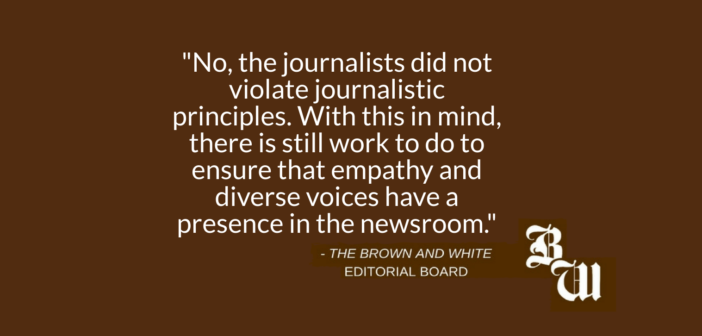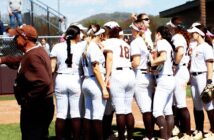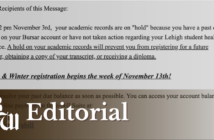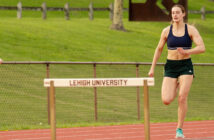On Nov. 11, Northwestern’s student newspaper, The Daily Northwestern, published an apology regarding its reporting of student protesting Jeff Sessions arrival on campus. The apology states that “We recognize that we contributed to the harm students experienced.”
The writers specifically addressed the photographs of students and methods of contacting students through a university directory.
As a fellow student publication, The Brown and White’s editors met to discuss what these events mean for student journalism. During what is typically our critique session, we reflected on both sides of the issue.
While the apology received national attention from experienced journalists, with an overwhelming disapproval for the decision to apologize, the issue is not as black and white when seen through the lens of modern student journalism.
The Daily Northwestern’s staff writes for the Northwestern community, as well as Evanston, Illinois. Following the controversy, the staff promises to “(work) on setting guidelines for source outreach, social media and covering marginalized groups.”
After contextualizing this statement, The Brown and White’s editorial board found that Northwestern University’s protest policies require a cautious understanding.
In May 2017, a group of students who stopped a guest lecture by a “U.S. Immigration and Customs Enforcement public relations representative” faced the university’s conduct process as a result of their protest. In January 2018, a student coalition demanded change to protest policies on campus.
The coalition demanded “more specific language and consistent updates,” improving the registration process so students can remain anonymous, and an office dedicated to overseeing registration.
Under Northwestern’s demonstration policy, there is no “typical sanction associated with violations of this Policy. Each case is context-specific.” This unclear wording leaves a gray area with regards to what punishment student protesters will receive if a protest fails to abide by standards that the student coalition sees as “vague and can be used in any way that the administration would like to apply to a student.”
Student journalists uphold the principles of journalism, which include our commitment to the truth and loyalty to citizens. The Daily Northwestern’s reporters did nothing fundamentally wrong in covering a protest on campus.
While The Brown and White’s editorial board disagrees with The Daily’s apology for taking photographs and contacting students through a university directory, nobody understands the impact of its reporting as transparently as the reporters and students were there.
Medill School of Journalism Dean Charles Whitaker said in a statement, “the coverage by The Daily Northwestern … was in no way beyond the bounds of fair.” While he agrees with the reporting, he emphasized the importance of diversity in the newsroom.
No, the journalists did not violate journalistic principles. With this in mind, there is still work to do to ensure that empathy and diverse voices have a presence in the newsroom.
Whitaker continued to say, “But regardless of their own identities, our student journalists must be allowed—and must have the courage—to cover our community freely and unfettered by harassment each time members of the community feel they have been wronged.”
Regardless of how their apology is received, the journalists involved will come out of this situation with a better understanding of the power of their work. With great power comes complex decisions and a sizable impact on our community.
While spectators comment on what they would have done differently, The Daily’s staff continued to do what journalists do: On Nov. 12, they continued to report and publish the truth.
It is important to reflect on instances such as this one and affirm the power of journalism. With this great power comes hard decisions and potential mistakes. What truly matters is that, no matter what, we will continue to report.
As young journalists, we have a responsibility to uphold the timeless principles of journalism, all while facing challenges to journalism’s future.
Whether or not The Daily made the right decision is up for debate. But regardless of the conflicting verdicts, the staff still published a paper the next day. And for that, they deserve to move forward and get back to the newsroom.






Comment policy
Comments posted to The Brown and White website are reviewed by a moderator before being approved. Incendiary speech or harassing language, including comments targeted at individuals, may be deemed unacceptable and not published. Spam and other soliciting will also be declined.
The Brown and White also reserves the right to not publish entirely anonymous comments.
3 Comments
BROWN AND WHITE EDITORIAL BOARD writes: “While the apology received national attention from experienced journalists,” (e.g. Andrew and Phil, see below) “with an overwhelming disapproval for the decision to apologize, the issue is not as black and white when seen through the lens of modern student journalism.”
”Phil Rogers
“As a working journalist of 44 years, I’m appalled at what I have read in this editorial. It was a public demonstration. Students chose to be there. A reporter asks questions, and publishes the answers. You ask someone’s name. If they don’t want to give it, so be it—they decline. If they give it, you can use it. Period. End of story. The larger question should always be about balance. But worrying about whether someone is going to get in trouble? That’s their choice for being there. (Some very courageous students in China, Egypt, numerous former Soviet bloc countries, and Hong Kong could fill you in on this).
Your job is to report on the event.”
Andrew Friedman
“As an attorney who has litigated First Amendment/Defamation issues and defended journalists, I wish you had used this editorial to explain to your fellow students how journalism and the First Amendment work. If students (or anyone else) protest in public, taking their photograph and reporting on the protest is fair game under the First Amendment. There was no intrusion on anyone’s privacy or “safety.” I applaud the university allowing speakers like Sessions – I don’t agree with his politics, but making universities into ‘safe spaces’ that limit points of view in public discourse is incredibly dangerous.
Student discomfort is not a valid or wise reason to dilute your coverage. Hard issues sometimes require people, particularly journalists, to ask hard questions. Regarding basic research to identify individuals involved in a public protest, do you think journalists who covered the protests in Charlottesville should have avoided photographing the protest activity or trying to interview individual protesters to protect their privacy or make them feel ‘safe,’ any more so than in this situation? You can’t honestly believe that groups on one end of the political spectrum somehow deserve more protection than on the other end. This is a nation that tolerates neo-nazis marching in Skokie and burning our own flag in protest. if someone doesn’t want to be interviewed, a simple ‘no comment’ does the job. Please don’t water down your coverage or pull your punches over misplaced (and Constitutionally infirm) hurt feelings – report on what needs to be reported on. tell it straight”
The flip side of the argument seems to be that the Evil Administration will go out of it’s way to lynch offending students for breaking vague rules with vague consequences. I suppose in the background is the thought that one should not be subjected or exposed to ideas or actions that one considers distressing.
What is “the lens of modern student journalism”? A scientist would say a lens enables one to see better or in more detail, what does a “modern student journalism” lens accomplish?
“The Daily Northwestern’s staff … promises to “(work) on setting guidelines for source outreach, social media and covering marginalized groups.”.. Is this a penalty from the Political Correctness (PC) court for a PC violation?
Kudos to The Brown and White for taking a reasonable stance on the subject even if it’s staff is probably to the left of Andrew and Phil. I think every school newspaper should have a designated “Reactionary of the Week” on staff, preferably a drama student.
Phil, Andrew, Robert. All names of well-educated white men well-protected by the social order we live in. All men who can afford to take some financial hit for courage, men who likely have or had other people raising their children for them, in a position to offer help financially or offer work, shielding and protecting them from harm. All men who, were they to suffer some loss for standing up for some belief, would have advocates saying it wasn’t fair, that they should get their jobs back, that they should get their positions back, that it wasn’t right that they were suffering or feeling humiliation. All people well-dressed and padded by other people to go marching into “marketplace of ideas” battles.
When more vulnerable people — minorities, poor people, single parents, immigrants — find themselves exposed and under attack for having used their voices, not only are they far less likely to find that they have any cushion protecting them, but they’re less likely to find protectors, people to look after and support their children, but the attacks are likely to be more vicious, more physically violent, more dangerous. When they lose jobs, the Phils and Andrews and Roberts don’t mount campaigns to help them, because they assume that the world is as it is for themselves: something will turn up, someone will help.
The effect is that the vulnerable lose their voices and only the Phils, Andrews, and Roberts are free to speak and demonstrate. Then, of course, they turn around and call vulnerable people who speak and protest but shield themselves with anonymity “cowards”. But I don’t think Phil, Andrew, and Robert would dare expose themselves the way those “anonymous cowards” do, because with enough digging, it’s possible to expose almost anyone. And I don’t think our boys would risk it if they really risked what these vulnerable people do when they protest.
Considering the harm one is likely to do in the course of reporting on a story is responsible journalism. You can report while protecting the vulnerable: you are in control of the camera, mic and pen. The most sensitive journalists are, in the end, the most trusted.
Your comment seems not to be concerning the The Brown and White (B&W) editorial, but the reaction to the Northwestern article, an issue which probably deserves comment, and the proverbial X white male (X=adjective or adjectives of your choice)
My apologies for being an educated, although some decry a Lehigh education, white male. It doesn’t mean I haven’t been subject to attack by others with more power for speaking the truth. My grandparents were immigrants who lived with their 12 children between the Susquehanna and the railroad, good for the garden but bad for the house due to periodic flooding. My grandfather was part of an extended strike which necessitated his walking to a temporary job in a different state, 3+ miles one way. A cousin of my mother was denied citizenship and did not become an illegal immigrant. So I may be privileged but I have some consideration for minorities, poor people, single parents, immigrants, et al. The church I attend is roughly 40% non white (Hispanic, Caribbean, African, African American, Indian, Filipino) which are all represented in a daily prayer group I am in.
This is not to say that if I was a white male with a rich daddy who got me a job in the company he owns, my comments would be any less valid because some would generalize that I had selfish or even evil intent
Andrew and Phil speak for themselves and not necessarily for me. Feel free to go to the Northwestern University site and vent on them because I am 99%+ sure they are not coming to the B&W site.
“Considering the harm one is likely to do in the course of reporting on a story is responsible journalism. You can report while protecting the vulnerable: you are in control of the camera, mic and pen. True but not relevant unless the reporter has nefarious intent or is a “yellow journalist”; even without them, there will be other unbiased reporters who will satisfy the public’s desire to be informed. There is a difference between those covering a story and those with an agenda which may not be obvious by what is written or the fact that a story appears in print. That discernment should be undertaken by the reader. So who is responsible for the assault on vulnerable people the reporter, the reader, the other side or the system?
Going back to the B&W editorial. “Under Northwestern’s demonstration policy, there is no “typical sanction associated with violations of this Policy. Each case is context-specific.” This unclear wording leaves a gray area with regards to what punishment student protesters will receive if a protest fails to abide by standards that the student coalition sees as “vague and can be used in any way that the administration would like to apply to a student.”” How do students react; probably to push limits. How does the administration react; more harshly as limits are pushed. The administration hopefully uses vagueness to promote justice which invokes cries of unfairness because different details demand different solutions for similar situations or cries of abuse of power. Law provides more uniformity but does not give justice and promotes arguments over the validity of the law. Respect for each other promotes justice and calls for agreement but doesn’t demand it. Law is a un satisfying but necessary fallback position when justice is lacking.